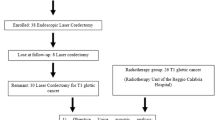Abstract
Introduction
The voice quality resulting from the radiotherapeutic treatment is a relevant factor to take into consideration at the time of evaluating the results. In this study the results of an objective assessment in relation to the vocal function and the patients' voice self-evaluation are presented.
Materials and methods
18 glottic tumour patients, at initial stage, treated with radiotherapy, were studied. There were made an objective analysis on the voice and a study on the perceived quality both by the examiners and the patients.
Results
p Normal voices were observed in the 11%, slight dysphonias in 44.4%, moderate dysphonias in 27.8% and severe dysphonias in 16.7% of the cases. Spectrographically, the 18 samples were classified as Grade I one case (5.5%), Grade II 7 (38.8%), Grade III 5 (27.7%) and Grade IV 5 (27.7%). The questionnaire
Voice Handicap Index
Which was completed by the patients themselves, gave out results values very close to normality.
Conclusions
The patients voice acoustic analysis of the series shows the damage thereof after the radiotherapeutic treatment is minimum as well as the handicap feeling of the T1 laryngeal carcinoma patients treated with radiotherapy.
Similar content being viewed by others
References
Smith JC, Jonson JT, Myers EN. Management and outcome of early glottic carcinoma. Otolaryngol Head Neck Surg. 2002; 126:356–64.
Núñez Batalla F, Corte Santos P, Sequeiros Santiago G, Señaris González B, Suárez Nieto C. Evaluación Perceptual de la Disfonía: Correlación con los Parámetros A cústicos y Fiabilidad. Acta Otorrinolaringológica Española. 2004;55:282–7.
Behrman A, Abramson AL, Myssiorek D. A comparison of radiation-induced and presbylaryngeal disphonia. Otolaryngol Head Neck Surg. 2001;125:193–200.
Stoeckli SJ, Guidicelli M, Schneider A, Huber A, Schmid S. Quality of life after treatment for laryngeal carcinoma. Eur Arch Otorhinolaryngol. 2001;258:96–9.
Fung K, Yoo J, Leeper HA, Bogue B, et al. Effects of head and neck radiation therapy on vocal function. J Otolaryngol. 2001;30:153–9.
Beahrs OH, Henson DE, Hutter RVP, Myers V. American Joint Committee on Cancer: Manual for Staging of cancer. Third edition. Philadelphia: JB Lippincott Company; 1988.
Yanagihara N. Significance of harmonic changes and noise components in hoarseness. J Speech Hear Res. 1967;10:531–41.
Fex S. Perceptual evaluation. J Voice. 1992; 6:155–8.
Jacobson BH, Jonson A, Grywalski C. The Voice Handicap Index (VHI): Development and validation. American Journal of Speech-Lenguage Pathology. 1997;6:66–70.
Hocevar-Boltezar I, Zargi M, Honocodeevar-Boltezar I. Voice quality after radiation therapy for early glottic cancer. Arch Otolaryngol Head neck Surg. 2000;126:1097–100.
van der Torn M, Verdonck-de Leeuw IM, Kuik DJ, Mahieu HF. Communicative suitability of voice following radiotherapy for T1 glottic carcinoma: Testing the reliability of a rating instrument. J Voice. 2002;16:398–407.
Verdonck-de Leeuw IM, Hilgers FJM, Zeus RB, et al. Multidimensional assessment of voice characteristics after radiotherapy for early glottic cancer. Laryngoscope. 1999;109:241–8.
Delsooehe KG, Zink I, Lejaegere M, Bastian RW. Voice quality after narrow-margin laser cordectomy compared with laryngeal irradiation. Otolaryngol Head Neck Surg. 1999;121:528–33.
Tamura E, Kitahara S, Ogura M, Cono N. Voice quality alter laser surgery or radiotherapy for T1a glottic carcinoma. Laryngoscope. 2003;113:910–4.
Morgan DAL, Robinson HF, Marsh L. Vocal quality 10 years after radioterapy for early glottic cancer. Clin Radiol. 1988;39:295–6.
Behrman A, Sulica L, He T. Factors predicting patient perception of dysphonia caused by benign vocal fold Lesions. Laryngoscope. 2004;114:1695–700.
Author information
Authors and Affiliations
Corresponding author
Rights and permissions
About this article
Cite this article
Cueva, J.C., González, B.S., Llames, A.L. et al. Voice quality assessment after laryngeal cancer radiotherapeutic treatment at initial stages. Clin Transl Oncol 8, 284–289 (2006). https://doi.org/10.1007/BF02664940
Received:
Revised:
Accepted:
Issue Date:
DOI: https://doi.org/10.1007/BF02664940



